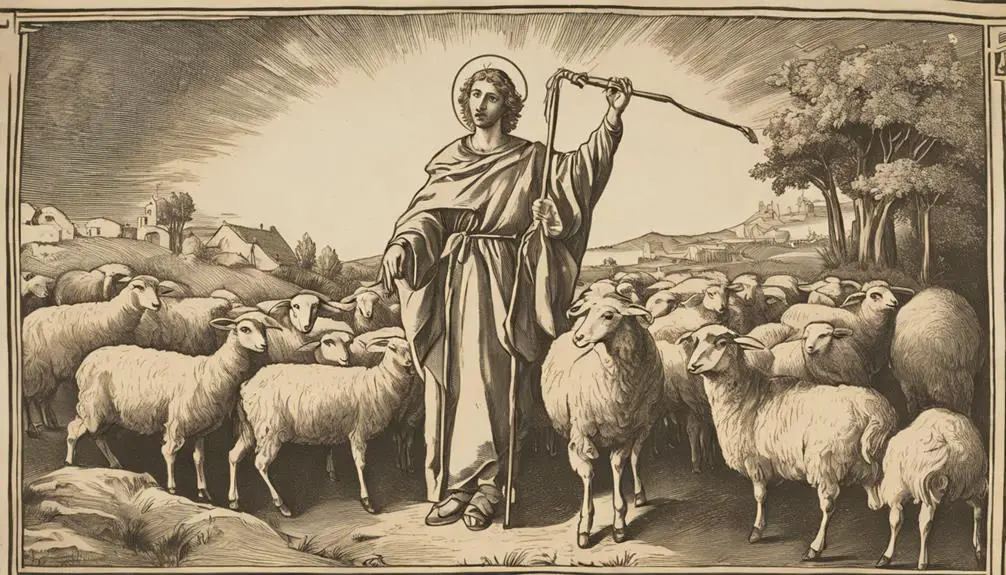Yearning to understand the Bible's most mentioned figure? Delve into the complex narrative of King David and discover his profound influence on faith.

A Study of David in the Bible
Did you know that David, the second king of Israel, is mentioned over a thousand times in the Bible, more than any other person? That's more mentions than Abraham, Moses, or even Jesus.
Yet, despite his prominence, there's so much about David that's open to interpretation and further exploration. From shepherd boy to king, his life was marked by moments of great faith, profound failure, and everything in between.
Why is this character so important and what can we learn from his complex narrative? Let's find out.
Key Takeaways
- David's anointing showcases God's choice of ordinary individuals for extraordinary tasks based on spiritual purity, not physical attributes.
- David's encounter with Goliath illustrates his faith and spiritual courage, relying on God rather than physical strength.
- David's relationship with Saul demonstrates his integrity and respect for authority, even when facing danger and betrayal.
- As a king, David left a significant mark on Israel's history, blending spiritual leadership with politics, and making profound contributions to the Psalms.
David's Early Life and Anointing

Diving into David's early life, you'll find that his anointing as a future king marks a significant turning point in his journey. David, the youngest of Jesse's eight sons, was tending his father's sheep in Bethlehem when Prophet Samuel, guided by God's voice, arrived to anoint a new king. It's crucial to note that David's anointing wasn't a public coronation but a private, prophetic act, setting the stage for his future.
David's anointing highlights God's distinctive selection process. It's not the physical prowess, age, or societal standing that God values, but the heart's purity. David, being 'a man after God's own heart', was chosen despite his humble status as a shepherd. His anointing symbolizes that the divine selection is based on inward character, not outward appearances.
David's early life teaches you about his humble beginnings and his divine selection. It shapes the narrative of his life, laying the foundation for his future roles as a warrior, poet, and king. God's providence in David's life, as seen in his anointing, sets him apart, signifying a life set for purpose and greatness. His story offers you insights into God's ways and His ability to use the ordinary for extraordinary purposes.
The David and Goliath Encounter

Building on his humble beginnings and divine selection, David's life took a decisive turn with his encounter with Goliath, a defining moment that truly showcased his faith and courage. In the face of daunting odds, you see David, a young shepherd, stepping up to challenge Goliath, the fearsome giant from the Philistine army.
This encounter wasn't merely a physical battle, but a spiritual one as well. David wasn't armed with traditional weaponry; instead, he chose a simple sling and five smooth stones. His true armor was his unwavering faith in God. He declared, 'The battle is the Lord's,' signifying his complete trust in divine intervention.
Analyzing this incident, you'll notice David's courage didn't stem from his physical prowess, but from his spiritual strength. His fearlessness was rooted in his firm belief that God was with him. This wasn't blind faith – it was faith backed by experience, as David had previously been delivered from the paw of the lion and the bear.
David's Relationship With Saul

After his triumphant victory over Goliath, David's life took another significant turn as he found himself intertwined in a complex relationship with Saul, the then King of Israel. Saul initially admired David's courage and skill, even appointing him as a high-ranking official in his army. However, Saul's admiration morphed into fear and jealousy as David's popularity grew.
This shift in Saul's attitude towards David is marked by two major incidents: Saul's attempt to kill David with a spear, and Saul's pursuit of David to eliminate him. Despite these threats, David maintained his loyalty and respect towards Saul, refusing to harm him even when he had the opportunity.
Here's a brief comparison of their relationship:
Saul's Attitude Towards David |
David's Attitude Towards Saul |
|---|---|
– |
– |
Admiration turned into jealousy |
Constant respect and loyalty |
Attempted to kill David |
Refused to harm Saul |
Pursued David to eliminate him |
Fled and hid, but didn't retaliate |
In studying David's relationship with Saul, you see a clear example of David's integrity and respect for authority, even under extreme duress and danger. This aspect of David's character is critical to understanding his later role as King of Israel.
David as King of Israel

Drawing from his experiences with Saul, David ascended to the throne, marking the start of his reign as King of Israel. You'll find his kingship was a crucial period in Israel's history, as David's decisions significantly impacted the nation's trajectory.
David's reign wasn't just about political control; it was about spiritual leadership as well. David's faith in God played a key role in his kingship, guiding his actions and decisions. This faith also led him to establish Jerusalem as Israel's capital, making it not just a political center, but a spiritual one too.
David's reign wasn't without challenges. He faced military conflicts, family turmoil, and personal downfalls. Yet, despite these hardships, he's often remembered for his victories and his devotion to God. One notable victory was over the Philistines, establishing Israel's dominance in the region.
David's tenure as king is also noted for the covenant God made with him, known as the Davidic Covenant. This covenant promised that David's descendants would continue to rule Israel, a prophecy fulfilled in the New Testament with the birth of Jesus, a descendant of David.
The Psalms of David

In addition to his influential reign, David is also renowned for his profound contributions to the Book of Psalms, demonstrating an intimate depth of spirituality and emotional honesty. You'll find that the Psalms David wrote are rich with personal experiences, raw emotions, and deep faith. They're not just prayers or songs, but reflections of his heart's deepest joys, sorrows, fears, and hopes.
Imagine yourself in David's shoes. He's facing intense persecution, he's driven to the wilderness, and he's wrestling with guilt. What does he do? He pours out his heart to God in the Psalms. You see, David didn't just write about the highs of life; he wasn't afraid to explore the depths of despair and longing.
He also wasn't shy to express his hope and trust in God. His psalms often conclude with a reaffirmation of God's faithfulness and steadfast love, giving us a window into his resilient faith. You can't help but appreciate his ability to maintain hope amidst trials.
Conclusion
You've journeyed through David's life, from his humble beginnings as a shepherd to his triumphant reign as king. You've witnessed his courage against Goliath and his complex relationship with Saul.
His Psalms showed you his deep faith and raw human emotions. It's clear that his story isn't just historical; it's remarkably relevant, offering timeless lessons on leadership, faith, and human nature.
Truly, studying David provides a profound understanding of biblical narratives and their impact today.



Sign up